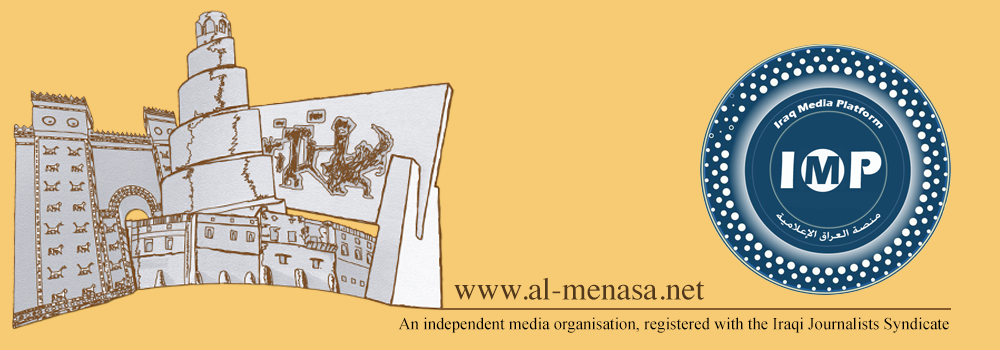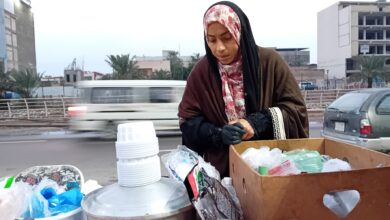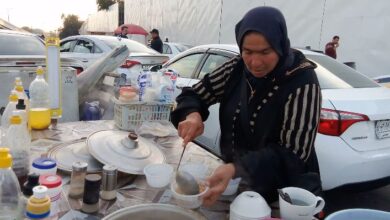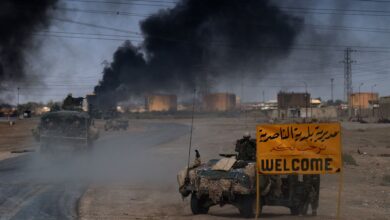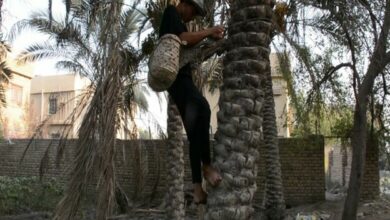The fall of Baghdad, and a friendship forged

Iraqi journalist Kholoud al-Amiri had only just arrived in Baghdad to start a new job when US forces invaded.
By Kholoud al-Amiri
The taxi driver refused my offer to pay him 100,000 Iraqi dinars (US$68) to drive me from Baghdad back to my family’s house in Karbala. It was a huge amount of money for a journey that, at that time, only cost around IQD2,500 (US$1.70).
But the driver said he was not about to risk his life for money – he had heard that Karbala had fallen to American forces and that they were advancing towards Baghdad.
I had only just left home, three days ago, to start work at a Baghdad-based newspaper. After we heard the US had invaded, I was terribly worried about my family back home and had come to a nearby garage, a starting point for the many private buses and shared taxis that form the country’s transport system, to see about getting back to Karbala.
Most of the drivers in the garage were angry or frightened or both. Landlines were not working, so they had no news about what was going on, and they didn’t want to drive anywhere. Most of them were stranded in Baghdad so they slept in the garage, waiting for the fighting to settle down.
“Baghdad will fall in a few hours, and I will take my bus to [Iraqi] Kurdistan and sell it,” one of the bus drivers told me. “I consider it a reward for all my years of service,” he said.
But I was desperate to get back to my family so I decided to walk to another neighbourhood, where my friend Ikhlas and her family live. My plan was simply to continue walking.
The streets were empty and the usual public transport – the half-destroyed minibuses that Iraqis call Tatas – had disappeared. Nearly half of the residents of Baghdad seemed to have left for other cities while the other half stayed at home, searching for news on local and international radio stations and desperately hoping that all would be well.
As I was walking, I was surprised to see large numbers of teenagers dressed in military uniforms in Zawraa park.
The park was filled with soldiers, who were ostensibly to make up the city’s internal defence forces. But most of them seemed to be frightened kids. Some jumped the fences and left the park and as soon as they reached the street, they replaced their military uniforms with civilian clothes. The soldiers left their vehicles behind but took their guns. Everyone was afraid. I understood from the soldiers’ conversations that some of their officers advised them to leave to save their lives.
I couldn’t help but think about the scared faces of the drivers and the teenage soldiers as I walked.
After walking for about an hour, I met some young men on the side of the road, perhaps waiting for a bus to pick them up. I was the only woman there and despite their fear, they were surprised to see me, as if to ask what brought me to the street at this time.
But basically I was a lost Karbala girl who only knew one way to reach her friend’s house – so I had taken it. If I got off the main road, I wouldn’t know where I was.
As I walked, I thought of my family. Did my mother and brothers die? Did the American forces bomb my village as they advanced? I had this feeling that if I returned to Karbala, I would not find any of my family alive. What if that was correct? Would I kill myself ?
I felt like my head was going to explode.
But then, a minibus pulled over and called out the name of my friend’s neighbourhood, Amiriyah. So along with the other people there, I ran to get a seat on the bus.
I managed to get to her house by sunset. I told her family what I’d seen on the streets and we spent time trying to get more news on everything from the Voice of America to the BBC, all of which had very different news than the local radio stations.
Two hours after I got to Ikhlas’ house, there was a knock on the door. My friend’s father opened the door and suddenly voice rang out: “Thank God he is safe.”
It was my Ikhlas’ brother, wearing a dirty military uniform and holding a white flag in his hand. The latter saved his life after he left his unit.
“It’s all over,” he told us. “They reached Mahmudiyah [about 30 kilometres south of Baghdad]. They will enter Baghdad tonight or tomorrow.”
I asked him about Karbala but he told me had had no information. “The Americans in their advance were shooting at anyone they saw,” her brother said. “Whoever wants to save his life should carry a white flag, so they allow him to pass.”
I couldn’t sleep that night, worrying about my family and trying to decide what to do. I thought maybe I could get to Karbala on foot – it would take two days walking but I could spend the night in the villages on the way.
I would not let anyone bury the bodies of my family while I was far from them, I vowed. This happened once before when my father died while I was away, and I would not repeat that, I said to myself.
The following morning, we heard news that the American forces had entered Baghdad, and all that remained was for them to take over the national radio station and the Palestine Hotel, where Saddam Hussein’s information officer, Muhammad Saeed al-Sahhaf, used to hold daily press briefings. One of the satellite channels showed al-Sahhaf walking quickly out of the hotel before American tanks surrounded it.
My friend’s father said he wouldn’t allow me to walk back to Karbala. “Let’s wait and I will take you to your family at the right time,” he said. “If you were killed or raped, I would not be able to face your family. Stay here with my daughters until we see what happens.”
I was not convinced but I had no alternative. I ended up staying at Ikhlas’ place for around a month. During that time, I watched her neighbours looting cars from a nearby company as well as local government offices. It made me feel like I was living in a Hollywood movie. We were short on food in the apartment and during the last few days, we only ate lentil soup. The bakeries were closed and there was no more gas to bake bread at home.
After about a month, my friend’s father told us that he had heard that the road to Karbala was open again and that cars had started to go there. I was so happy I cried and he promised me he would take me there as soon as possible.
I did not sleep that night. I was overwhelmed with anxiety and fear. I got up at dawn and we made our way to the western edge of the city, from where many taxis and buses depart for Karbala. There myself and Ikhlas’ uncle, who was accompanying me, managed to board a minibus heading to the city.
All the way there, I was so worried but when we finally got to Karbala I was very surprised. Everything was quiet in the city and life was strangely normal, as if there was no war going on. The market and the streets were the same and I thought maybe it was only a rumour that the Americans had occupied the city.
It takes about 20 minutes from the city centre to get to my family’s village and we got another shared taxi there. Shortly before we took the turnoff there, I saw a large camp of coalition forces, about 10 kilometres outside the city and realized it wasn’t just a rumour.
As the taxi drove into my village, I was astonished to see there was no trace of any kind of war damage there either. I saw a neighbour walking in the street. “We thought you were dead. Thank God you’re alive,” he called out, astonished to see me.
When we got to the door of my family’s home, the driver honked the horn several times. My mother come out and I saw her scanning the people getting out of the car. Finally her eyes found me. She sat down on the ground, overjoyed to see me and began crying.
Just as I had though they were dead, They had all thought I was dead too.
My mother went to pick some vegetables from our farm to give to Ikhlas’ family and my brother helped her uncle buy some supplies from the local stores, before he returned to Baghdad.
When I eventually returned to Baghdad to find another job, I looked for friends and colleagues, many of whom had disappeared during the US invasion. Some of them I never saw again and I still don’t know what happened to them. Others I met again, sometimes years later. As for Ikhlas, we remain fast friends to this very day.
